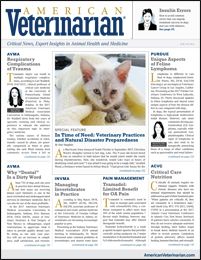Making Connections
As part of our multifaceted approach to providing expert veterinary insight, we’re also proud to announce our inaugural Pet ConnectionsTM video series.

The prevalence of diabetes mellitus in dogs and cats is on the rise. According to Banfield’s State of Pet Health 2016 Report, the incidence of feline diabetes increased by 18.1% between 2006 and 2015—from 57.2 to 67.6 cases per 10,000 cats. And, although the prevalence is not nearly as high in dogs, the spike in canine diabetes incidence over the same time period was much more drastic—from 13.1 to 23.6 cases per 10,000 dogs, or 79.7%.
Diabetes in pets requires lifelong care and monitoring. It’s a diagnosis that can be over- whelming to pet owners, particularly those who have no familiarity with the disease. To ensure the best care for these patients, it’s vital that veterinary teams remain up-to-date on all aspects of this disease to provide clients with the best support and most accurate advice on how to manage their pet’s condition.
Even with the best intentions, many problems can result from mistakes in insulin choice, handling, or administration; errors in monitoring; and inappropriate feeding protocols. In this issue, J. Catharine Scott-Moncrieff, VetMB, MA, MS, professor of small animal internal medicine and head of the Department of Veterinary Clinical Sciences at Purdue University’s College of Veterinary Medicine, outlines how to avoid the many common errors that can affect a diabetic pet’s response to treatment.
As part of our multifaceted approach to providing expert veterinary insight, we’re also proud to announce our inaugural Pet ConnectionsTM video series. This innovative series—the first of its kind in veterinary medicine—features candid discussions between pet owners and veterinary professionals on diseases and conditions affecting companion animals.
Diabetes was purposefully selected as the first Pet ConnectionsTM topic because of its pervasiveness and the important role the veterinarian-client relationship plays in ensuring that diabetic pets live long, happy lives.

The program, which focuses on home management of pets with diabetes, is as valuable for veterinary professionals as it is for pet owners. Moderated by Richard Goldstein, DVM, DACVM, executive director and chief medical officer of US diagnostics for Zoetis, the program features Ruth MacPete, DVM, a practitioner in San Diego, California, and Brittney Cirone, a veterinary technician in Langhorne, Pennsylvania. The group is joined by Azi Chegini and her 3-year-old dog, Spider, who has diabetes.
With the look and feel of an intimate talk show, Pet ConnectionsTM is both informative and conversational, touching on advances in diabetes diagnosis and management, and addressing the concerns of pet owners caring for a diabetic animal. The 14 segments in the series range from 3 to 10 minutes in length and encompass an array of important topics, including the signs of undiagnosed diabetes, the important role of veterinary technicians in the management process, and how to educate pet owners about home monitoring.
“One of the things that has changed, one of the things we do so much better now than we used to, is monitoring,” Dr. Goldstein explained. “There was a time when I was a resident and the only really reliable piece of data we had was owner perception.”
Also included in the program are 2 in-clinic videos hosted by Gary Edelson, DVM, owner of Imperial Point Animal Hospital of Delray in Delray Beach, Florida. Dr. Edelson provides viewers with an overview of insulin, including how to handle, store, and administer it, and discusses why monitoring is so important. Included is a demonstration of how to set up, use, and read a glucose meter—invaluable hands-on information for pet owners.
Of course, diabetes will also be covered in depth at the 2018 Atlantic Coast Veterinary Conference. American Veterinarian® has the great privilege of hosting this long-running conference from October 8 to 11 at the Atlantic City Convention Center in Atlantic City, New Jersey. Check out ACVC.org for the complete conference agenda, and be sure to take advantage of early-bird registration, which is available until June 30.
Mike Hennessy, Sr
Chairman and CEO
